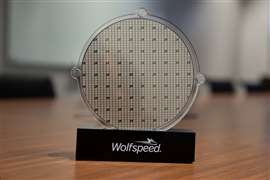Construction of $3 billion chip plant in Germany delayed by 2 years
20 June 2024
The construction of a $3 billion chip plant for US-based Wolfspeed in Germany has been delayed by two years later than its original target start.
 US power chip maker Wolfspeed’s silicon carbide 200mm wafer on display at Wolfspeed’s Mohawk Valley Fab in Marcy, New York. (Image courtesy of Wolfspeed/Handout via REUTERS/ File Photo)
US power chip maker Wolfspeed’s silicon carbide 200mm wafer on display at Wolfspeed’s Mohawk Valley Fab in Marcy, New York. (Image courtesy of Wolfspeed/Handout via REUTERS/ File Photo)
Wolfspeed had originally planned to start construction in the state of Saarland to make computer chips for electric vehicles (EVs).
It has not been scrapped entirely but the company is still seeking funding for it, according to a report by Reuters.
A company spokesperson said that Wolfspeed has cut capital spending following weakness in the European and US EV markets. The business has shifted its focus to ramping up production in New York and won’t start construction in Germany until mid-2025 at the earliest.
Companies including Intel, TSMC, Infineon, STMicroelectronics and GlobalFoundires announced plans for European chip plants after the European Union launched its Chips Act in 2022 amid a global shortage of semiconductors.
But two years on, few projects are being built and fewer have received European Commission approval for state aid, according to Reuters.
The EU’s Chips Act is competing with similar plans in the US, China and Japan and the legislation aimed to raise €43 billion (US$47 billion) through public and private investments.
Separately, the timing on a $33 billion Intel plant in Magdeburg, Germany, has slipped, according to the report. Preparatory work was due to start this year but has been pushed back. The site features a rich layer of topsoil which under German law has to be preserved and redistributed to farmers before construction can start. Some 80,000 truckloads of earth will have to be removed.
“The first facility (at Magdeburg) is expected to enter production within four to five years following the European Commission’s approval,” an Intel spokesperson told Reuters.
Meanwhile TSMC still plans to start work this year on an $11 billion plant in Dresden, Germany, together with car chip makers Robert Bosch, NXP, and Infineon.
French-Italian firm STMicroelectronics last month won EU approval for a 5 billion-euro silicon carbide plant being built in Italy.
Onsemi announced on Wednesday that it plans to spend up to $2 billion to expand its silicon carbide operations in Czech Republic, pending EU approval.
Germany’s Infineon, which began building a 5 billion-euro power chip plant in Dresden in 2023 at its own risk, is on track for 2026 completion, despite not yet having EU aid approval.
CONECTAR-SE COM A EQUIPE




